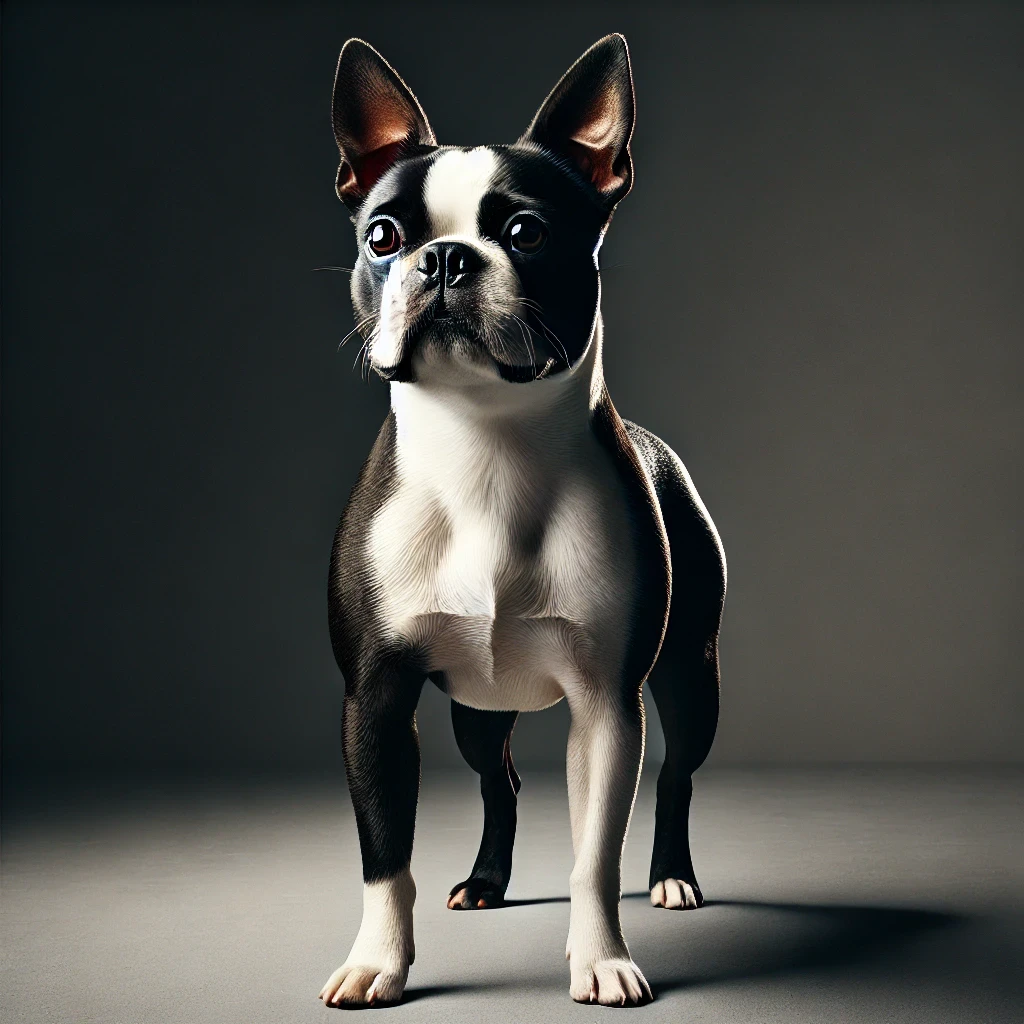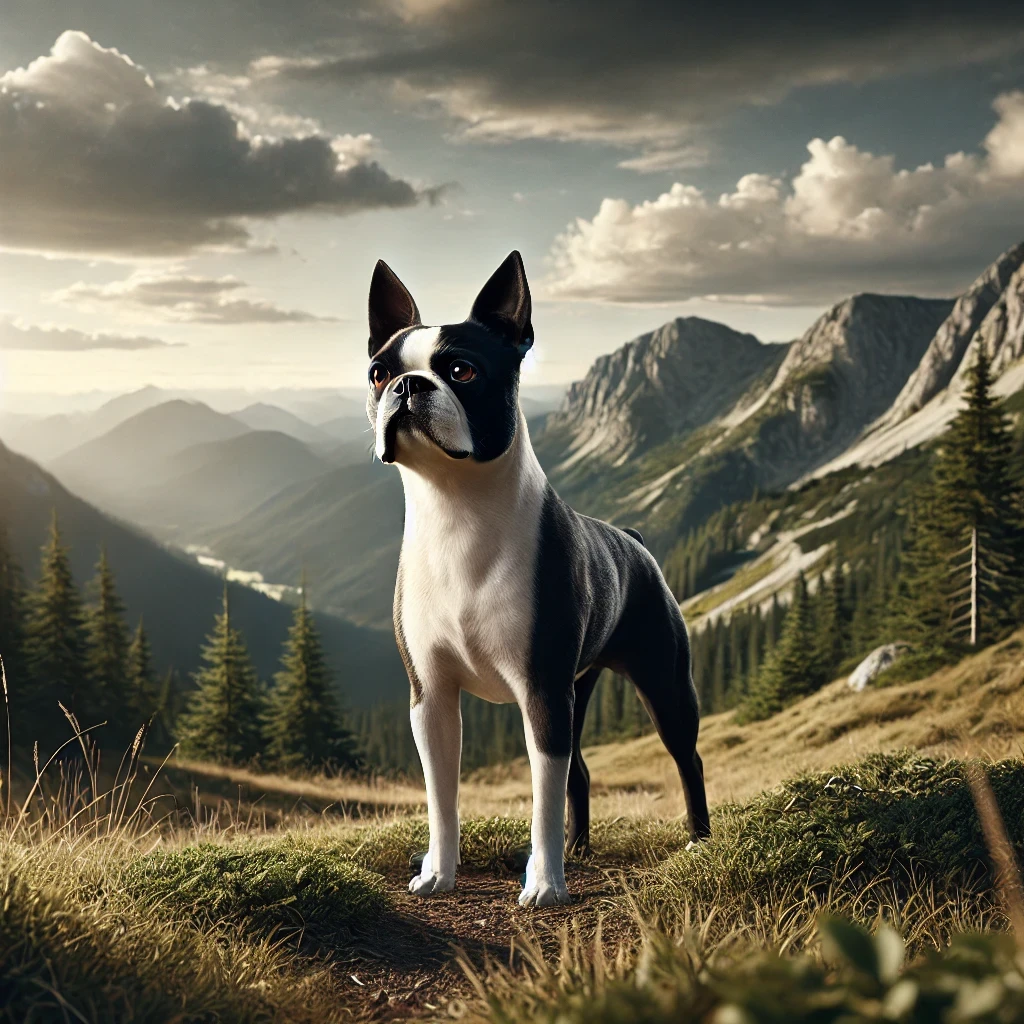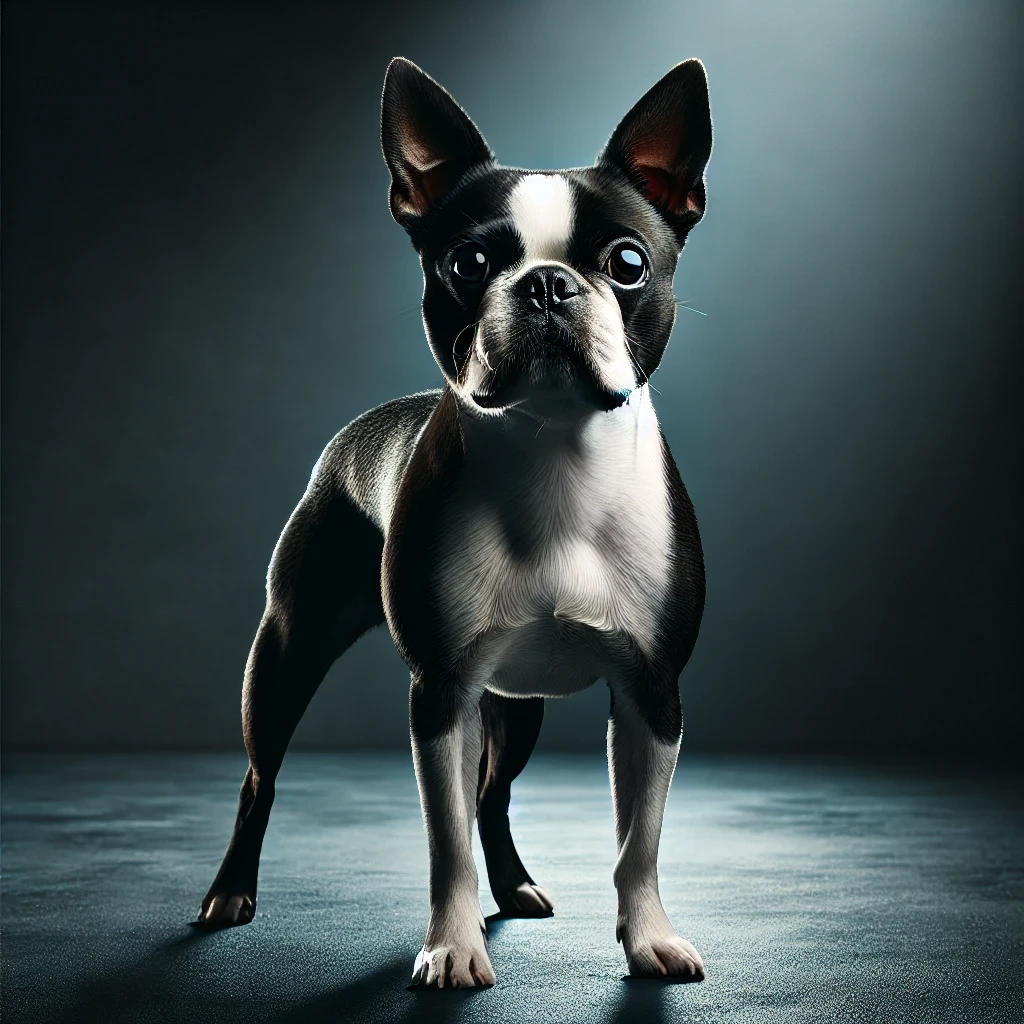In this complete guide, we’ll explore everything you need to know about the Boston Terrier dog breed. From their fascinating American roots and signature personality traits to grooming needs, health concerns, and living requirements, this article is your one-stop reference for understanding the breed inside and out.

Known affectionately as the “American Gentleman” for their tuxedo-like coat and charming personality, the Boston Terrier is a small breed with a big heart. Famous for their expressive eyes, square head, and compact, muscular build, Boston Terriers are one of the most beloved and recognizable breeds in the United States.
Despite their classy appearance, these dogs are full of spunk and spirit. They’re playful, intelligent, affectionate, and adapt well to various lifestyles—whether it’s a bustling family household or a quiet apartment in the city. Their loyal nature and easygoing temperament have earned them a spot as a favorite among dog lovers for more than a century.
Origins of the Boston Terrier
One of the most distinctive Boston Terrier dog breed facts is that this breed is truly All-American. Unlike many popular dogs that trace their origins to Europe or Asia, the Boston Terrier was developed right in the United States—specifically, in the city of Boston, Massachusetts.
The Breed’s Ancestry
The story begins in the late 1800s, when Boston dog enthusiasts began crossing the English Bulldog with the now-extinct White English Terrier. Their goal? To create a new type of dog—one that had the strength and tenacity of a bulldog, but in a smaller, more manageable size with a gentler personality suitable for companionship.
The first known Boston Terrier was a dog named “Judge”, who was owned by a man named Robert C. Hooper of Boston. Judge is believed to be a cross between a Bulldog and a White English Terrier, and he became the foundation of the Boston Terrier line. His descendants were gradually refined through generations of careful breeding, producing dogs with the distinct short snout, compact frame, upright ears, and refined temperament that define the breed today.
Official Recognition
By the 1890s, the breed had gained significant popularity in Boston and beyond. Enthusiasts formed the Boston Terrier Club of America in 1891, and after some back-and-forth about breed standards, the American Kennel Club (AKC) officially recognized the Boston Terrier in 1893.
This recognition was historic—it marked the first time the AKC recognized a U.S.-developed dog breed, cementing the Boston Terrier’s status as a proud American original.
Nickname: The American Gentleman
The nickname “American Gentleman” stems from the breed’s elegant black-and-white coat pattern, which resembles a tuxedo, and their polite, sociable demeanor. Despite their bulldog ancestry, Boston Terriers are known for being gentle, friendly, and highly affectionate, making them ideal house dogs and excellent companions for families, singles, and seniors alike.

Temperament and Personality of the Boston Terrier
When it comes to Boston Terrier dog breed facts, one of the most celebrated qualities is their exceptional temperament. These compact canines are known for being friendly, intelligent, and full of character, making them one of the best small dogs for families, seniors, and first-time pet owners alike.
Playful and People-Oriented
Boston Terriers love being around people—plain and simple. They form strong attachments to their owners and thrive in environments where they can be part of the action. Whether it’s playing with children, cuddling on the couch, or following you from room to room, a Boston Terrier always wants to be involved.
Their playful personality makes them natural entertainers. Don’t be surprised if your Boston develops a habit of clowning around to make you laugh—they have a charming, sometimes goofy sense of humor.
Intelligent and Eager to Please
Thanks to their high intelligence, Boston Terriers are quick learners and respond well to positive reinforcement. While they may not have the single-minded drive of working breeds, they are capable of learning a wide range of tricks and commands. Obedience training, puzzle toys, and short daily lessons help keep their minds sharp and their behavior in check.
However, some Boston Terriers can be a bit stubborn—a trait inherited from their bulldog ancestry. Early socialization and consistent, gentle training are key to helping them grow into well-mannered adult dogs.
Affectionate and Loyal
A standout Boston Terrier temperament trait is their deep loyalty to their human family. They are highly affectionate and often seek out physical contact—curling up in your lap, leaning against your leg, or sleeping beside you. This makes them excellent emotional support dogs and companions for people living alone.
Their sensitive nature also means they don’t respond well to harsh corrections. Instead, Boston Terriers thrive in homes where they’re treated with patience, kindness, and a stable routine.
Alert and Adaptable
Boston Terriers may be small, but they’re naturally alert and aware of their surroundings. While not aggressive by nature, they make good watchdogs and will often bark to alert you of unusual activity. That said, they’re generally not yappy and tend to calm down quickly once they recognize there’s no threat.
They’re also highly adaptable—another reason why they make such great pets for city apartments or suburban homes alike. As long as they get adequate exercise, attention, and love, Boston Terriers are happy just about anywhere.
Good with Children and Other Pets
Are Boston Terriers good family dogs? The answer is a resounding yes. They’re typically gentle and patient with children, making them wonderful playmates. Their small size and non-aggressive demeanor also mean they usually get along well with other dogs and even cats—especially if raised together or properly introduced.
However, because of their strong bond with their family, Boston Terriers can suffer from separation anxiety if left alone for long periods. It’s best to create a daily routine and ensure they have enough companionship, whether human or furry.

Exercise Needs and Training
Though they’re small, Boston Terriers are full of energy. Regular activity keeps them physically fit and mentally sharp.
Daily exercise recommendations:
- Two short walks per day (20–30 minutes)
This helps burn off energy and supports healthy weight. - Indoor playtime and games
Tug-of-war, fetch, or even puzzle toys work well to keep them stimulated. - Mental enrichment
Boston Terriers enjoy learning new tricks and benefit from obedience training or even basic agility courses.
Training Tips:
✅ Use positive reinforcement like treats and praise.
✅ Keep training sessions fun and short—5 to 10 minutes is enough.
✅ Start socialization early to prevent nervousness around strangers or other pets.
✅ Be consistent, especially with housebreaking, which may take a little patience.
Common Health Concerns
As a brachycephalic breed (flat-faced), Boston Terriers can face specific health issues. Being informed about these risks helps you give them the best care possible.
⚠️ Brachycephalic syndrome – Their short snouts can make breathing difficult, especially in heat or humidity.
⚠️ Eye problems – Their large, prominent eyes are prone to injuries, ulcers, and dry eye.
⚠️ Patellar luxation – A common issue in smaller breeds where the kneecap slips out of place.
⚠️ Deafness – Some Boston Terriers, especially those with a lot of white on their head, may be deaf in one or both ears.
Routine vet visits, a balanced diet, and keeping them cool during hot months can go a long way toward preventing issues.
📊 Statistical Boston Terrier Dog Breed Fact:
According to a 2021 study by the Royal Veterinary College (RVC), over 72% of Boston Terriers were diagnosed with at least one health condition in a single year, with the most common issues being eye disorders (32.8%), skin conditions (22.8%), and breathing problems (18%) due to their brachycephalic (flat-faced) anatomy.
Coat and Grooming
One of the easiest Boston Terrier dog breed facts to love is how low-maintenance they are when it comes to grooming.
🖤 Their coat is short, smooth, and sleek, often black-and-white, brindle-and-white, or seal-and-white in a tuxedo pattern.
🪮 Brush once a week with a soft-bristle brush to remove loose hair and keep the coat shiny.
🧼 Bathe occasionally, about once a month or when dirty.
🧽 Clean their facial wrinkles and under their eyes regularly to prevent irritation.
👂 Check ears weekly for wax or debris, and keep nails trimmed monthly.
Boston Terriers are considered low shedders, which makes them a great choice for clean households or allergy-sensitive owners.
Nutrition and Feeding
Feeding your Boston Terrier the right diet is essential for energy, digestion, and long-term health.
- High-quality dry kibble, with real meat and limited fillers, works well.
- Avoid overfeeding—Boston Terriers can be prone to weight gain.
- Feed twice a day, and adjust portions based on age and activity level.
- Fresh water should always be available.
Treats are great for training, but moderation is key to avoiding obesity.
Read Cost of a Vet Visit for Dogs: What Owners Should Expect
Fun Facts About Boston Terriers
🐶 The Boston Terrier is the official state dog of Massachusetts.
📦 They were once known as “Round Heads” or “Boston Bulls” before becoming standardized.
🐾 Their expressive, large eyes are among the biggest (proportionally) in the dog world.
🎓 The Boston Terrier is a common mascot for colleges and sports teams due to their strong personality and American roots.
🌟 Some Boston Terriers even snore or grunt in their sleep—adding to their comedic charm.

Is the Boston Terrier Right for You?
When exploring Boston Terrier dog breed facts, one of the most important questions potential owners ask is whether this breed is a good fit for their lifestyle. The good news? The Boston Terrier is one of the most versatile and adaptable small dog breeds, suited for a wide range of living situations and experience levels.
Perfect for Apartment Living
Boston Terriers are a top choice for apartment dwellers. Their compact size, quiet nature, and moderate energy levels make them ideal for small spaces. Weighing between 12 to 25 pounds, they’re easy to manage in tighter environments and do not require a backyard to stay happy.
Because Boston Terriers aren’t excessive barkers, they won’t disturb neighbors easily. They also adapt well to indoor potty routines or short outdoor walks. A few daily walks and light play sessions are usually enough to keep them mentally and physically satisfied.
Learn How Often Should Dogs Go to the Vet
Great with Kids and Families
As a family-friendly dog breed, Boston Terriers are affectionate, playful, and gentle. They form strong bonds with children and enjoy being part of a household routine. Their sturdy yet compact frame allows them to play safely with kids when supervised, and their sociable temperament makes them eager to participate in family activities.
Teaching children how to handle dogs respectfully will help create a positive relationship and prevent any accidental roughness. With proper socialization, Boston Terriers typically get along well with other household pets too.
Ideal for Seniors
Boston Terriers are an excellent choice for older adults and retirees seeking companionship. Their manageable size and low-maintenance grooming needs make daily care easy, and their affectionate, loyal personalities offer emotional connection and purpose.
They don’t require strenuous exercise and are usually content with leisurely walks and cuddle time. Many seniors also appreciate how well Boston Terriers adapt to calm, consistent routines without being overly demanding.
A Smart Choice for First-Time Dog Owners
For those new to dog ownership, Boston Terriers are one of the best breeds to start with. They’re highly intelligent, eager to please, and generally easy to train using positive reinforcement methods.
Their calm temperament, sociable nature, and manageable grooming routine make the overall learning curve less steep. First-time owners will find Boston Terriers to be a responsive, engaging, and deeply rewarding companion when given consistent guidance and affection.
Be Prepared For The First Vet Visit Puppy Guide
Things to Consider
Despite their many strengths, Boston Terriers come with a few considerations:
- They are a brachycephalic breed, which means their short snouts can cause breathing difficulties, especially in hot weather or during intense exercise.
- They are emotionally sensitive and thrive on companionship, so they may not do well in homes where they are left alone for long hours.
- While not aggressive, they can become stubborn without proper training and mental stimulation.
Final Thoughts: Boston Terrier Dog Breed Fact Recap
If you’re looking for a loyal, affectionate, and intelligent small dog that thrives in apartments, fits into family life, and doesn’t require excessive grooming or exercise, the Boston Terrier may be your ideal match. Whether you’re a retiree, a young couple in the city, or a first-time dog owner, this charming and adaptable breed has all the makings of a lifelong companion.
Visit Dog Breed Facts
